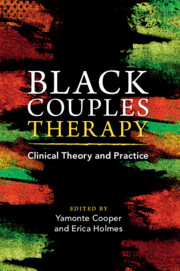Book contents
- Black Couples Therapy
- Black Couples Therapy
- Copyright page
- Contents
- Figures
- Tables
- Contributors
- Foreword
- Acknowledgments
- Introduction
- Part I Race, Racism, and Identity
- Part II Foundations for Healthy Coupling
- Part III Adapting Major Therapeutic Approaches for Work with African American Couples
- Part IV Sex and Intimacy
- Chapter 11 Sexual Intimacy in Black Heterosexual Couple Relationships: Challenges and Opportunities toward Relational Intimacy
- Chapter 12 Intimacy, Desire, and Sex in the African American Relationships
- Chapter 13 Wearing a Mask in Love: Implications for Covering and Infidelity in Black Relationships
- Part V Special Topics
- Index
- References
Chapter 11 - Sexual Intimacy in Black Heterosexual Couple Relationships: Challenges and Opportunities toward Relational Intimacy
from Part IV - Sex and Intimacy
Published online by Cambridge University Press: 27 July 2023
- Black Couples Therapy
- Black Couples Therapy
- Copyright page
- Contents
- Figures
- Tables
- Contributors
- Foreword
- Acknowledgments
- Introduction
- Part I Race, Racism, and Identity
- Part II Foundations for Healthy Coupling
- Part III Adapting Major Therapeutic Approaches for Work with African American Couples
- Part IV Sex and Intimacy
- Chapter 11 Sexual Intimacy in Black Heterosexual Couple Relationships: Challenges and Opportunities toward Relational Intimacy
- Chapter 12 Intimacy, Desire, and Sex in the African American Relationships
- Chapter 13 Wearing a Mask in Love: Implications for Covering and Infidelity in Black Relationships
- Part V Special Topics
- Index
- References
Summary
Sexual intimacy in couple relationships in the Black community has been under siege since the arrival of enslaved Africans in the United States and has interfered with heterosexual Black men and women creating and preserving healthy sexually intimate bonds. This chapter explores sociopolitical factors, including gender roles, and power dynamics that affect sexual intimacy among heterosexual Black couples. Culturally specific factors that can promote resilience are highlighted with a view toward increasing the understanding of Black heterosexual relationships as emotionally supportive spaces, with an emphasis of intentional intimacy as acts of social justice. Creative interventions for use in clinical practice are offered to assist in expanding sexual intimacy with Black couples.
- Type
- Chapter
- Information
- Black Couples TherapyClinical Theory and Practice, pp. 255 - 272Publisher: Cambridge University PressPrint publication year: 2023



